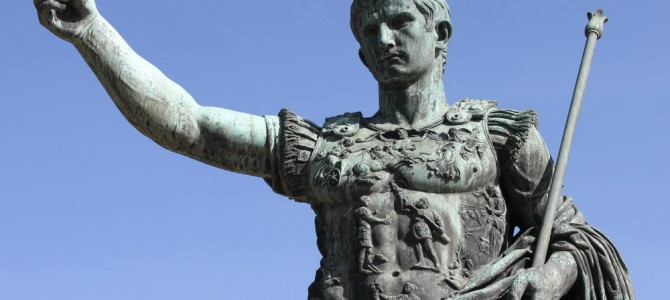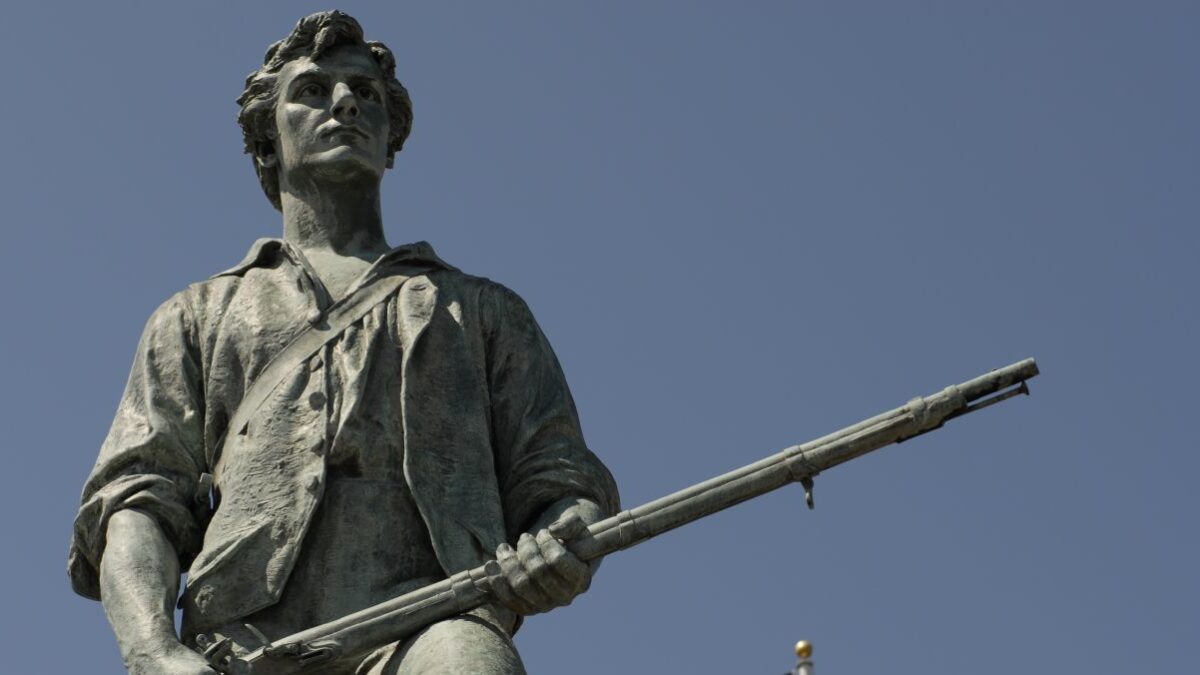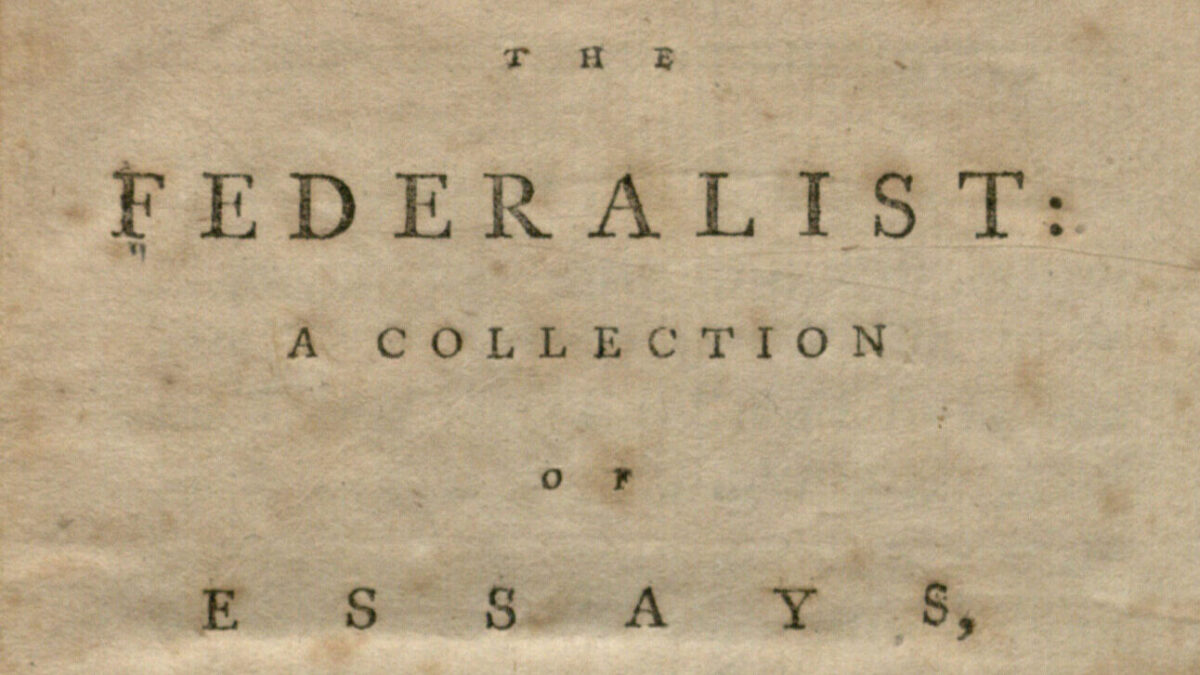
Sunday was March 15, known to the culturally literate as the Ides of March. On that day in 44 BC, Julius Caesar was infamously stabbed to death in the Roman Forum.
Aside from perhaps wondering why the only Latin words in Shakespeare’s “Julius Caesar” are “Et tu, Brute?” it’s also worth pausing to think on what the “Ides of March” really meant. That Julius Caesar was stabbed on the Ides of March is both historical fact and a commonplace, so rotely repeated by schoolchildren and the trivia-minded that it’s been drained of its import. But there is more here than mere ancient history.
Who Was Caesar?
We should first ask, who was Caesar? Gaius Julius Caesar was no mundane rabble-rouser; he was the second of Rome’s charismatic dictators. The first had been Lucius Cornelius Sulla, who in 81 BC revived the dormant (but fully constitutional) office of dictator—originally intended only for circumscribed use during periods of grave military crisis—and used it as a means to reshape Roman governance and butcher his enemies. (Among those enemies was a teenaged Caesar, who only narrowly escaped death himself. Ironically, Sulla was reluctant to spare the young man’s life, warning those who pled on his behalf that “there are many tyrants within this one.”)
Caesar’s political career was based on his prestige as a general, and it began in regular constitutional order. However, as the Senate’s grip on power began to slip and Caesar’s domestic alliance (the First Triumvirate) fractured, he followed in the footsteps of Sulla and Marius and marched his army into Italy, seizing power. This dictatorial power was achieved not just by the backing of the legions he commanded, but also on the strength of Caesar’s personal popularity with the masses.
Moreover, Caesar was distinguished by generosity towards his defeated foes at home. And here was a man who not only fought gloriously against the Gauls abroad but, after defeating his domestic foes, refused to execute them en masse as Marius and Sulla before him had done. Instead, he sought to befriend them. For a republic which had witnessed the horrors of mass slaughter, civil war, and periods of near-anarchy, Caesar’s treatment of his political rivals was a striking departure from the norms of the previous 40 years.
The problem was, Caesar was too popular—and he knew it, and flaunted it. His magnanimity was unfeigned, but so was his desire to rule Rome alone. He was convinced it was for the best, that the Senate was no longer capable of handling the administration of an expanding empire without collapsing into bloody civil war amongst competing factions of noblemen. But then most men who seek despotic powers convince themselves of the same.
The rule of the Senate, and the abhorrence of any idea of kingship, was the official ideology of the Roman polity. This institution had clawed its way from ephemeral, impermanent, and advisory status to the primary legislative body in Rome across generations of wrack and ruin. So when Brutus, Cassius, and the rest of the senatorial conspirators stabbed Caesar to death on the Ides of March, it represented a last gasp at retaining their primary role in guiding the path of state.
So: March 15, 44 BC. Caesar’s crumpled body lay in a bloody puddle on the floor of the Roman Forum. The Republic had been saved, right? Wrong. It didn’t work. It never could have worked.
Fractured Self-Interest Killed the Roman Republic
Julius Caesar wasn’t the Republic’s problem. He was a symptom of the problem. The real problem was something far more intractable: competing Senate factions and families had become so consumed with claiming power, glory, land, and the spoils of war that they had ceased seriously addressing the business of ruling an expanding empire.
The Senate failed to realize that over the past decades of recurring civil war, broken promises of reform, and dissipated morals, it had forfeited any claim upon the loyalty of the masses. So while murdering Caesar removed the Senate’s immediate rival to power, it could never cure its underlying failures. The senators soon found this out the hard way with the emergence of Marcus Antonius, better known to history as Mark Antony: a gifted rhetorician, successful general, and immensely popular as Caesar’s ally.
Antony was, at heart, a hedonist and a flake, but his initial seizure of the anti-Senate mantle was telling for the fate of Rome. The senators had played their factional games but forgotten the lesson from of the bad old days of the Gracchi, of Marius and Sulla: the people, however fickle, had a voice, too, and were at best indifferent to senatorial prerogatives, or actively supported a Man On A Horse. So when Mark Antony emerged, the people of Rome—most of whom had never known anything except civil war—did not think “we must preserve the glory of our form of government!” Rather, they thought, “Well, that’s enough of these upper-class twits. Let’s have a man of the people instead.” Edward Gibbon famously summarized this dynamic at the start of his “Decline And Fall of the Roman Empire”:
The provinces, long oppressed by the ministers of the Republic, sighed for the government of a single person who would be the master, not the accomplice, of those petty tyrants. The people of Rome, viewing with a secret pleasure the humiliation of the aristocracy, demanded only bread and public shows…The rich and polite Italians, who had almost universally embraced the philosophy of Epicurus…suffered not the pleasing dream to be interrupted by the memory of their old tumultuous freedom…The republicans of spirit and ability had perished in the field of battle, or in the proscription. (Vol. I, chap iii)
The Senate Gladly Gives Its Power to the Executive
Enter Octavian. Gaius Octavius, nephew of Julius Caesar and later his adoptive son, was known as Octavian during most of his life and only late-adopted the name by which he is known to history: Augustus Caesar. More importantly, he was one of the most brilliant politicians to have ever drawn breath.
How brilliant was Octavian/Augustus? This brilliant: after Caesar’s assassination, Octavian fought another 14 years of civil war, first against the senators Brutus and Cassius, then against his erstwhile ally Mark Antony. At the end of these wars he returned to Rome and won the greatest triumph of all: he turned the Republic into the Empire, sweeping away the 450-year-old Roman prohibition on one-man rule, and he did it by consent of the Senate itself. He “boiled the frog,” as the old adage goes, stripping away the powers of the Senate with caution and tact, careful at all times to respect its dignity even as he relieved it of duty.
Augustus understood the sense of the Senate at this point: exhausted by nearly a century of intermittent civil war, weakened, purged of its firebrands, bewildered by the domestic challenges of the Republic, and unable to reach accord with one another. These men, unlike their forefathers, were willing to give up the hassles of running the Republic to a strong executive, so long as it was understood that the Senate was merely “loaning” Augustus its power.
He was happy to play along with this illusion. Augustus appreciated the reality that legislative power, once voluntarily surrendered, is rarely if ever recovered. Augustus’ formal title as ruler of Rome was never Emperor, it was “Princeps.” The word has descended to us in English as “prince,” but in the Latin of Augustus’ day it meant “first citizen.” This was not intended as euphemism. First Augustus may have been, but a mere citizen he remained. All are equal!
Augustus knew better. He saw that the Senate had become addicted to peace, and comfortable in its indolence, willing to trade the hard work of governing an unruly city, its nearby allies, and its far-flung provinces for the price of appropriate deference. (After all, an empire is difficult to administer—why not delegate this onerous task to the seemingly-reasonable Princeps?)
Augustus insisted on testing the Senate on this point. In 27 BC, he came to the Forum and announced it was time to for him to step down and restore the Senate to its full powers. His job had been to bring peace and secure order, he claimed, and having done so it would be an insult to the majesty of the Senate and the Republic for him to retain such control. A noble speech, but one with an outcome that Augustus had been assured of in advance: the Senate not only rejected his resignation, they reappointed him by acclamation to another ten-year term. (This farce would be repeated as each ten-year term expired, until it was dispensed with altogether as an unnecessary formality.)
At this point the game was well and truly up. Augustus was now the Indispensable Man, and the Senate had willingly recognized it.
Once the Republic Is Gone, It’s Gone
That, friends, is how a republic dies. Not instantly, not by brute force, but through physical and moral exhaustion, and in slow, methodical steps. What must never be forgotten (as Gibbon emphasizes) is the willingness with which the Senate ultimately gave away its power, after fighting Julius Caesar for it. Augustus, political genius that he was, made it easy to accede to someone who flattered their sensibilities and offered them the trappings and prestige of power with none of the actual responsibility.
Later on, when faced with emperors far more degraded than Augustus, the Senate would scramble to reclaim the power it had foolishly given away. It was too late. The people no longer had any real memory of the Senate exercising control over the affairs of Rome. The army had become loyal to idea of a sole Caesar, leading them into battle and sharing the spoils of war with them. And the Senate itself, frankly, had no understanding of how to wield power or influence anymore.
By the time of such legendary debauchees as Caligula and Nero, the institution of the Senate had devolved into little more than a repository for well-bred sybarites. Much like the French nobility gamboling about the grounds of Versailles under the later reign of Louis XIV, Roman senators spent their time jockeying for positive attention from the emperor, avoiding his occasionally baleful gaze, playing meaningless status games with one another, and exercising a merely honorific “authority.” Their civic muscles had atrophied; they had forgotten what it meant to rule a nation. There was no going back.
Thankfully, this sort of thing could never happen in the United States.









